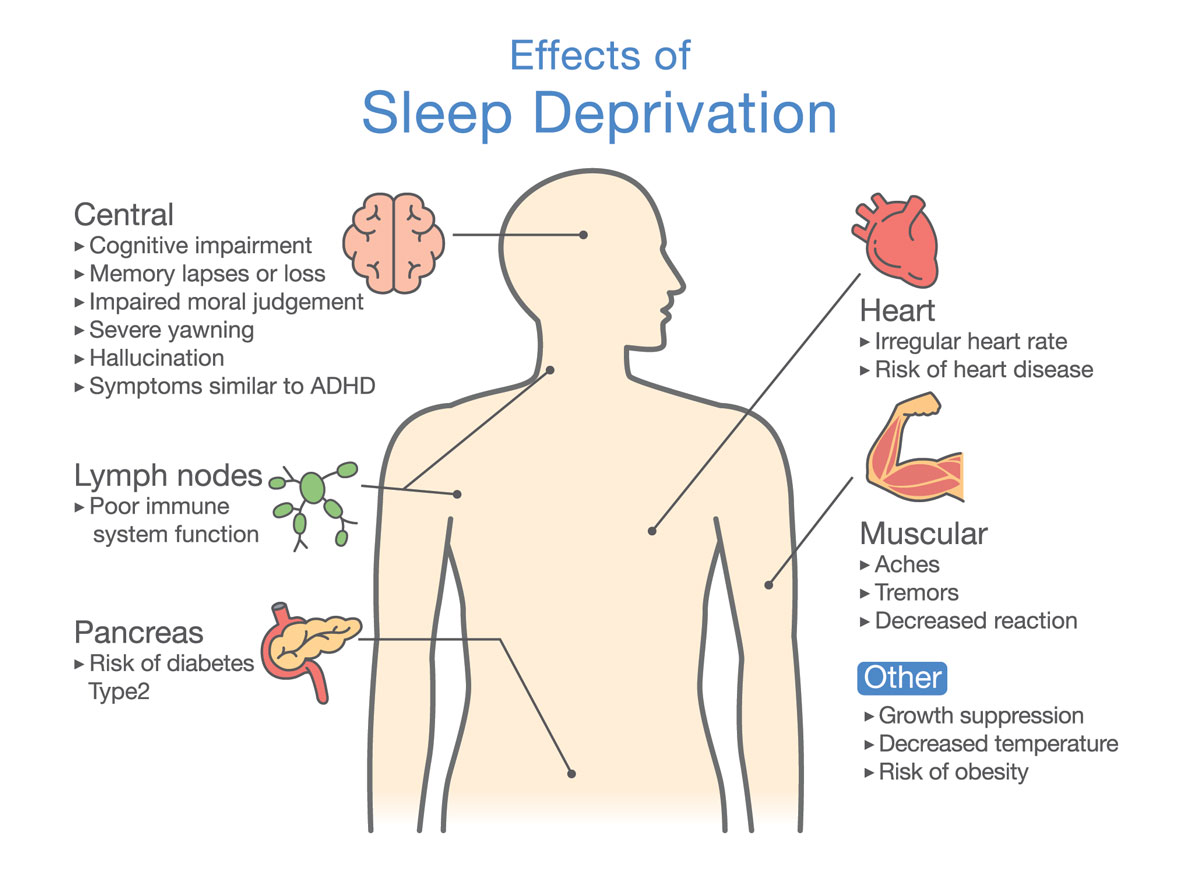Sleep just might be one of the most underappreciated bodily necessities. Across the world, adults are not getting enough sleep. While this may not seem alarming at first, businesses will feel the effects of sleep deprivation from entry level positions to the c-suite. By getting enough quality sleep each day, productivity can remain at peak levels and help everyone reach their goals in record time — no late nights necessary. Use this guide to learn about the impact of sleep deprivation on productivity and how to clean up your sleep habits to get quality rest.

What is Sleep Deprivation?
Sleep deprivation occurs when people do not get enough sleep each night. Adults need at least seven hours of rest each night while teens and kids need much more. People do not have to go days without rest to feel sleep deprived. In fact, the symptoms of sleep deprivation can occur after just one night without adequate, uninterrupted sleep.

Common sleep deprivation symptoms include:
- Daytime sleepiness
- Difficulty concentrating
- Poor memory
- Slow reaction times
- Low motivation
- Mood swings
If left unaddressed, sleep deprivation can increase the risk of developing serious health problems, such as heart disease.
Why Does Sleep Deprivation Cause Issues?
Sleep deprivation causes so many problems because it robs the brain and body of the time it needs to recuperate from the prior day. While sleeping, all bodily systems work on repairing cell damage and preparing for the day ahead. The brain also works on repairing damage along with storing memories and other important functions.
Without completing those vital processes, the brain and body struggle to keep up the next day. The brain then orders the release of stress hormones that help compensate for the lack of sleep, which only serve to make matters worse.
How Does Sleep Deprivation Affect Productivity and Decision-Making?
By staying up late and getting work done, many feel like they are getting a jump on the day. On the other hand, staying out late or watching shows past midnight can feel like a good way to unwind after a stressful day at work. Over the long term, however, both of these practices can negatively affect performance and productivity at work. With all its debilitating symptoms and health effects, sleep deprivation is listed as the cause, at least partially, of many manmade disasters. The Chernobyl and Three-Mile Island nuclear accidents, for example, were both caused by sleep deprived individuals making poor decisions in critical moments.

Although it is rare that everything goes wrong so spectacularly, sleep deprivation can still make it difficult to complete daily work tasks and achieve key career goals. While dealing with feeling sleepy all day and having poor concentration, completing the simplest tasks may prove challenging. Productivity metrics often tank as a result, leaving you trying to pick up the pieces while still feeling tired and run down.
How Sleep Deprivation Affects Employee Performance
According to a study performed by the Hult International Business School, working professionals are simply not getting enough sleep each night and it is affecting their work performance. While only getting just over six hours a rest each night, participants reported that they:
- Could not stay focused during important work meetings
- Took a lot longer to complete tasks while tired
- Found it difficult to come up with excellent new ideas
- Experienced a decrease in motivation to learn
While suffering from sleep deprivation, these individuals reported a decline in creativity and a complete lack of focus when it comes to all their job duties. They also had a hard time managing multiple demands at once.
All these factors greatly decrease productivity and performance across the board, causing people to have to take more work home with them every night. As they stay up late trying to complete that day’s tasks, their ability to get enough sleep declines, resulting in a vicious cycle of sleep deprivation and poor productivity.

Tips for Improving Sleep Quality
The only thing that can help restore productivity caused by sleep deprivation is committing to getting enough quality rest. There is no making up on lost sleep by simply sleeping in here and there, either. The brain and body demand daily rest to truly wake up feeling rejuvenated and ready for the upcoming daily activities. Use these tips to improve sleep quality and get enough rest each and every night.
Cleanse the Bedroom of Electronics
To have the desired effect, sleep needs to be uninterrupted throughout those seven plus hours of rest. Otherwise, the restoration processes run by the brain and body are disrupted enough to impact the next day.
Unless there are little ones or pets in the house, keeping disruptions to a minimum is as easy as getting rid of electronics in the bedroom. Their bright lights and loud noises can wake people up out of a peaceful slumber, causing them to feel sleep deprived the next day. Switch off the devices or leave them in another room before bed to eliminate this issue.
Ban Electronics Before Bed, Too
The soft glow of electronic devices can wreak havoc on sleep before heading to bed as well. Watching TV, playing computer games, or simply browsing the web on a smartphone can all prove detrimental when it comes time to go to sleep.
Exposure to the artificial blue light disrupts the internal clock, telling the brain that it is not time to rest. To solve this problem, either adjust the light spectrum on the device with an app or stop using electronics at least an hour before bed.
Set Up the Lighting with Sleep in Mind
The light in the home can have a similar effect if it is not the ideal spectrum or brightness for sleep. The brain uses the light in the room to gauge when it is time to rest. Exposure to bright lights can reset this process, leaving people feeling alert and awake right before bedtime.
Consider switching to smart lights that allow adjustment of their brightness levels and hue through an app. As bedtime approaches, set the lights to reduce their brightness levels and enter a warmer spectrum. This will help circadian rhythms stay on track and ensure sleep comes quickly when it is time for bed. Also, set up motion-activated night lights along the path to the bathroom to ensure late night visits do not require overhead lights.
Only Take Smart Naps at the Right Times
As they also disrupt the natural circadian rhythm, naps should be avoided as much as possible. If a nap is inevitable, time it just right to avoid the repercussions. Only nap early in the day to avoid pushing back bedtimes.
Also, keep naps short at about 20 to 30 minutes apiece to avoid dipping into the later REM stages of sleep. The later REM stages can make people feel groggier than they started unless the REM cycle is completed in full, which can take hours. If naps are a regular occurrence, consider scheduling them to net the biggest benefits of each quick sleep session.
Schedule Bedtimes
Bedtimes also need to be scheduled to ensure the mind and body get enough rest every night. With the same bedtime every night, circadian rhythms can stay on point and trigger sleepiness at just the right moment. Using productivity tools can help you achieve your goals during the day — reducing the temptation to stay up late in order to catch up on tasks that could have easily been completed earlier. Keep the same bedtime schedule on weekends as well to avoid disrupting this rhythm.
Trust the Process
Prior productivity levels may not all come back in an instant but stick with it and they will. When you leave the nighttime work behind and get good quality sleep every night, the mind and body are better prepared to be fully productivity during work hours. Then, you can get all the tasks done by the end of the day, eliminating the need to burn the midnight oil.
Commit to improving sleep quality and start reaping the rewards today in the form of improved rest and productivity. Begin with the tips above to bring your sleep quality and quantity into the target range.
Bonus Tip: A new mattress can improve the quality of your sleep. Visit Best Mattress Picks for help choosing the right bed for your needs.
About The Author:
Justin Havre of Justin Havre & Associates of RE/MAX First is a seasoned real estate professional and team leader. Well known throughout the real estate industry, Justin has given lectures at international real estate conferences and works closely with his team to ensure every last person is performing to their best potential.
What would you like to know and what would be the best way to share this information to you? What is the best tips & tricks, what workaround do you use? We'd really appreciate your insight on these ones to make our integrations better, more productive and much more efficient. Comments, tweets are always welcome.